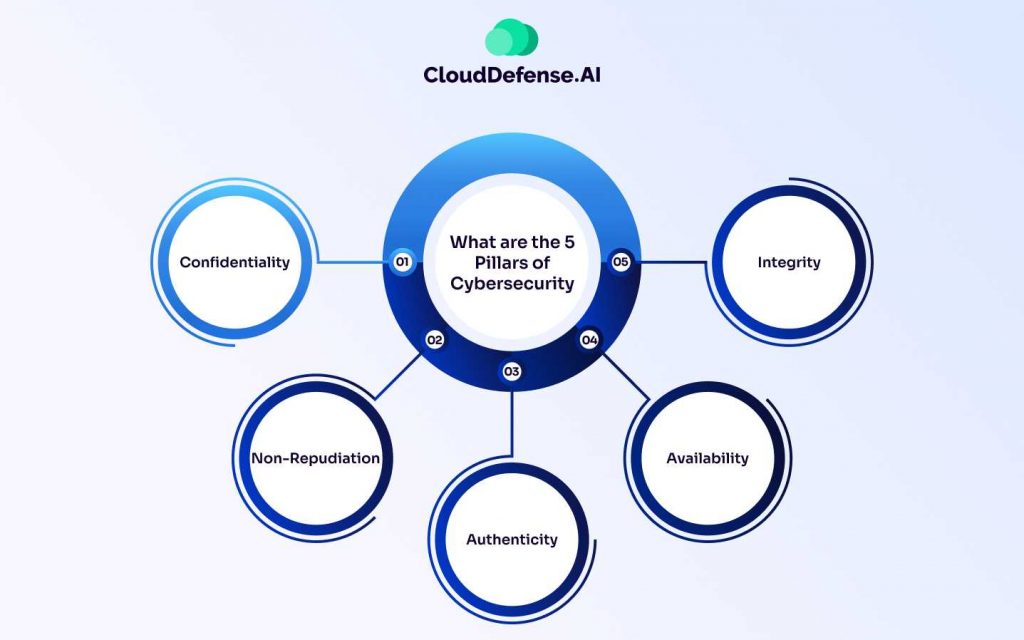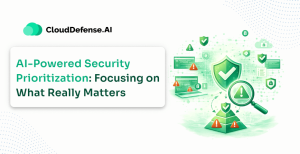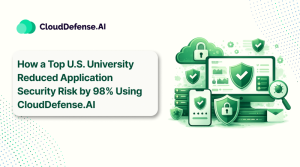Data is the most valuable asset and the workflow of every business intricately depends on it. Due to this, it has become a necessity for every organization to focus on the protection of data and digital assets.
From storing data in the cloud, performing digital communication, and making banking transactions to deploying applications based on the cloud, the digital world has become an inseparable part of business workflow.
As the usage of cloud and digital assets continues to rise, the requirement for robust cybersecurity strategies continues to increase. Implementing a robust cybersecurity framework in a business relies on the 5 pillars of cyber security.
Basically, these critical pillars of cyber security create the foundation of a successful cybersecurity program and encompass vital security aspects that fortify your defense against cyber attacks.
It is essential for businesses to understand the 5 pillars of cyber security as it will help them create a resilient defense system. In this article, we will explore the 5 pillars of cyber security and how they will help protect your data.
What Is Cybersecurity?
Cybersecurity indicates the sets of practices and methodologies utilized for protecting data, systems, servers, networks, devices, and other entities in infrastructure from all kinds of cyber attacks.
Every organization operating in the cloud utilizes cybersecurity to prevent malicious actors from accessing, manipulating, and completely deleting sensitive data and also launching ransomware attacks.
Implementing a robust cybersecurity strategy has become a necessity for every business because threat actors are always looking for ways to exploit your infrastructure.
Cybersecurity enables the organization not only to create a defensive layer for the business infrastructure and applications running on it but also the digital assets, sensitive data, and employees associated with it.
Cybersecurity creates multiple layers of protection that help teams identify vulnerabilities and mitigate any attack that can jeopardize the workflow. Cybersecurity encompasses several disciplines, and they are:
- Network security.
- Cloud security.
- Endpoint security.
- Application security.
- Mobile security.
- IoT security.
- Operational security.
- Zero trust.
Cybersecurity is achieved in an organization through the implementation of various technologies, policies, processes, and security measures involving firewalls, encryption, authentication, passwords, etc.
The implementation process also involves multiple hardware and software tools that work together to improve the overall security posture and prevent the infrastructure from all kinds of attacks. However, the overall implementation gets more complex and sophisticated as the corporate network and digital assets grow.
The Importance of Cybersecurity
With increasing dependency on the digital landscape, the importance of cybersecurity in modern times can’t be understated.
Cybersecurity plays a pivotal role in contemporary society as it helps safeguard critical data and the workflow of vital infrastructures like plants, hospitals, financial services, and others. Here, let’s take a look at all the factors that make it essential:
Protection of All Sensitive Data
As more organizations are inclining towards digitalization, data is becoming a more critical component for smooth functioning, and hackers are always trying ways to jeopardize it.
Cybersecurity plays a crucial role in the protection of all these sensitive data like PII, financial information, and intellectual property of an organization and maintains smooth functioning.
Mitigating Cyber Attacks
A robust cybersecurity infrastructure is highly instrumental in mitigating various types of cyber attacks like malware, phishing, DDoS, ransomware, etc. Cyber attacks can ultimately jeopardize the workflow of a business and incur financial and data loss.
Preserve Operational Continuity
Cyber attacks can disrupt the operation of any business, which not only causes severe financial loss but often leads to a complete shutdown.
However, cybersecurity ensures the continuous operation of critical systems and services by preventing attacks and mitigating server downtime.
Maintains Trust and Reputation
A cybersecurity framework in an organization plays a pivotal role in maintaining trust among customers, stakeholders, and partners.
Moreover, effective cybersecurity also helps organizations preserve their reputation in the market by preventing unauthorized access to digital assets and data and various cyber incidents.
Compliance With Regulatory Requirements
Almost every industry operating from different geographical locations are subjected to specific strict regulation where they have to employ security measures to protect digital assets and sensitive customer data.
Failure to comply with regulations like GDPR, PCI DSS, and HIPAA can result in legal consequences and severe fines. Cybersecurity enables every organization to implement security measures, policies, and infrastructure that help to stay compliant with the regulatory requirements continually.
Preservation of Customer Privacy
Many organizations, in one way or another, collect, store, and share the personal data of customers to offer better customer services.
They are also tasked with protecting these personal data from surveillance, interception, misuse, and unauthorized access. Cybersecurity helps in protecting those data and maintaining customer privacy.
Promotes Growth
A comprehensive cybersecurity infrastructure enables an organization to grow and build trust among users and stakeholders in the market.
It encourages them to focus on functional services and the development of new applications without worrying about cyber attacks or data breaches.
What Is The CIA Triad?
The CIA triad is a widely recognized information security framework that is designed to help organizations evaluate their security posture. CIA stands for confidentiality, integrity, and availability, and it outlines the core objective of information security.
An effective cybersecurity model must consist of these three objectives because they help in maintaining optimum security posture while performing daily business operations.
Confidentiality, integrity, and availability provide a framework for cybersecurity experts and help them determine when they need to audit, upgrade, and implement tools and programs.
For many information security standards, like HIPAA, PCI DSS, and GDPR, CIA serves as the base concept. When an organization meets all three security objectives, the security posture becomes more robust, and it can mitigate all types of cyber threats and security incidents.
Let’s take a look at the 3 pillar of cybersecurity that forms the CIA triad:
Confidentiality
Confidentiality is the first pillar of the CIA triad, which indicates that only authorized and verified users have the ability to access sensitive information. It suggests that the organization’s goal is to protect classified information from malicious actors and limit access to only authorized uses or systems.
An organization should make an effort to maintain confidentiality when data is sent over a network by hackers and apply various methodologies and techniques to safeguard the data even if hackers intercept it.
Integrity
Integrity in cybersecurity indicates that an organization should make an effort to ensure that the data remains unaltered, trustworthy, and accurate during storage, processing, and transmission. The primary goal of the organization is to implement security measures that will prevent unauthorized modification of data and maintain reliability throughout.
Cybersecurity professionals should maintain integrity because it indicates that the data available are accurate and everyone is getting the right information. Compromise in Integrity of data can happen in many ways, and it can cause severe damage to an organization’s workflow and reputation.
Availability
Availability indicates that the data and resources of an organization should be accessible by authorized users anytime they want. Even if an organization maintains confidentiality and integrity, if the data is unavailable to authorized users, then the whole effort will be futile.
The organization makes the data always available to authorized users without compromising on integrity and confidentiality. To ensure the data is always available, organizations have to prevent attacks like DDoS because it severely disrupts the network and makes the data inaccessible.
What are the 5 Pillars of Cyber Security?

The 5 pillars of cyber security are a set of principles that organizations must follow to develop a robust cybersecurity framework for protecting data. The 5 pillars of cyber security are confidentiality, non-repudiation, authenticity, availability, and integrity.
To ensure the optimum protection of data and digital assets, organizations have to address these 5 key areas. Now, let’s go into details of all 5 pillars of cyber security strategy:
Confidentiality
Confidentiality serves as one of the vital pillars of modern cyber security because it assures that data is only available to authorized users within an organization. It also ensures complete protection of data and digital assets from unauthorized users and malicious actors.
During transmission, storage, and processing, organizations have to make all the effort to keep the data secret and safe from bad actors who might use it for malicious work. The key idea of maintaining confidentiality is that only users and systems with the correct authorization should be able to access specific data and no one else.
To maintain confidentiality, the organization sends data in encrypted form to ensure only the recipient can decrypt the data and third-party users can’t access it. Encryption standards such as AES and DES are helping organizations to safely transport data even if attackers are able to intercept them.
Utilizing VPN tunnels, organizations can safely send data while maintaining confidentiality. However, there are many ways that can hamper confidentiality, and direct attacks like man-in-the-middle attacks serve as the most prolific ones.
Non-Repudiation
Non-repudiation refers to the process of verifying a transmission where it verifies that the data is delivered by the intended sender only. It is an essential aspect of modern information security because it helps ensure that the system or user transmitting the data is provided with delivery proof.
It also enables the recipient system or users to verify where the data came from, and no third party can’t interfere with the transmission data. This pillar also ensures that any third party can’t block the intended sender and receiver from sending, receiving, and accessing the transmitted data.
Businesses can go through the system log to check the evidence of data transmission and verify whether the data is sent by the intended sender to the intended receiver.
For example, when you want to send an essential message to a business stakeholder, non-repudiation will ensure that you are sending the message to the right recipient. No one can modify the data except the sender or receiver.
Authenticity
Authenticity is another pillar in the modern information security realm, as it verifies whether the user has the right to view the data. Authentication helps protect them from third-party users and ensures hackers are not impersonating a user to access the data.
It indicates that a user has to provide all the necessary proof before they can access the data and resources. Authentication can be done using several processes, and the most popular choices are passwords, biometric information, email, and various other metrics.
Nowadays, almost every application requires authentication through a username and password before they allow users to access the application data and resources. This is the most effective to prevent hackers from replicating a particular user and gaining access to their data.
Authenticity not only makes the data inaccessible to hackers and systems but also makes sure the correct user has complete control over their data.
Availability
Availability indicates that an authorized user or system can easily access the data anytime without compromising on any of the security factors. Availability enables organizations to keep the data always available to the authorized user, and they can access it even in the occasion of a database failure or any mishap.
Availability requires organizations to maintain data stability and make it easily accessible through constant maintenance and security updates.
It also means the organization has to implement various security measures that will protect the server, network, and database from hackers who can block the transmission or launch an attack to cause server downtime.
DDoS or DoS attacks are widely utilized by attackers to disrupt the network and make the data unavailable.
Besides, power outages and natural disasters can also make the data unavailable to users. Apart from preventing cyber attacks, organizations should leverage redundant networks and make frequent upgrades to applications to keep the data always available.
Integrity
Data integrity is a significant aspect of the modern cybersecurity landscape because it provides the assurance that the data is accurate and free from unauthorized modification. It indicates if an organization is storing user’s data, they need to ensure that the data is free from corruption.
This also shows that any changes made to the data should be logged and reflected to the system and administrator properly. Integrity is a vital pillar because it assures that the database is entirely accurate, unchanged, and secure during its lifecycle.
Data integrity is highly crucial for businesses that manage confidential information like personal data, financial data, or health records. Any kind of data corruption can cause failure to maintain integrity, which leads to economic and reputation loss.
Implementing data tracking, access level, encryption, digital certificate, and various other security measures can help organizations prevent hackers from illegally tampering with the data. Many systems also utilize Secure Hash Function and Message Direct 5 to determine the integrity of data.
How do 5 Pillars Help in Protecting Data?
The 5 pillars of cyber security play a pivotal role when it comes to protecting data, as they provide a comprehensive framework that guides organizations to ensure optimum security of all sensitive data.
When an organization accomplishes the 5 pillars of cyber security for your organization, it provides the assurance that your data is completely safe and accurate. Confidentiality ensures that the data of an organization is entirely secure and won’t be disclosed to any unauthorized users.
The non-repudiation pillar ensures the data is delivered to the intended user only with proof of delivery, and only the sender and receiver can modify the data. Authenticity, on the other hand, helps in protecting the data by allowing only the authorized user with proper credentials to access the data and preventing unauthorized access.
The integrity pillar helps the organization to ensure that the data that is being used and transmitted is wholly accurate and safe from all kinds of unauthorized access.
Lastly, for availability, the organization has to make the data available to the authorized user all the time but without compromising on the data. These 5 pillars of cloud cyber security collectively create a strong foundation for organizations to protect the data by emphasizing the key focuses of these 5 pillars.
FAQ
When Should You Use the CIA Triad?
THE CIA triad forms the cybersecurity fundamentals where each component outlines specific goals for information security.
They are widely utilized in many security situations, but mainly when an organization is managing user privileges and permission for data access. On many occasions, organizations use the CIA triad while classifying data.
What is the primary goal of cyber security?
The primary goal of cybersecurity is to ensure the complete safety of stored data, control data access, and prevent unauthorized access and modification of data. Cybersecurity is also tasked with maintaining the integrity and confidentiality of data used by organizations.
Who created the CIA triad?
The CIA triad serves as a core objective of modern information security, and it was formed over time. There is no single entity that has formed the CIA triad; it is often indicated that stakeholders of information security established it over time.
Confidentiality was first mentioned in a US Air Force study in 1976, and similarly, integrity was first proposed in 1987 in a study formed by David Clark and David Wilson. The concept of availability came into light in 1988, although many suspect it had been proposed earlier. However, it was in 1998 when three concepts were mentioned together as a CIA triad.
What are the main pillars of cyber security?
The main pillars of cyber security are formed by five components: confidentiality, non-repudiation, authenticity, availability, and integrity. Together, the five components outline the primary goal of information security and help the organization focus on areas for data protection.
Conclusion
For organizations dealing with sensitive data, it is essential for them to understand the 5 pillars of cyber security as it provides comprehensive information security frameworks.
It highlights the key goals that every organization should focus on safeguarding the data. Through this guide, we have appropriately described each of the components of the 5 pillars of cyber security so that you can build a robust security infrastructure for data protection.







